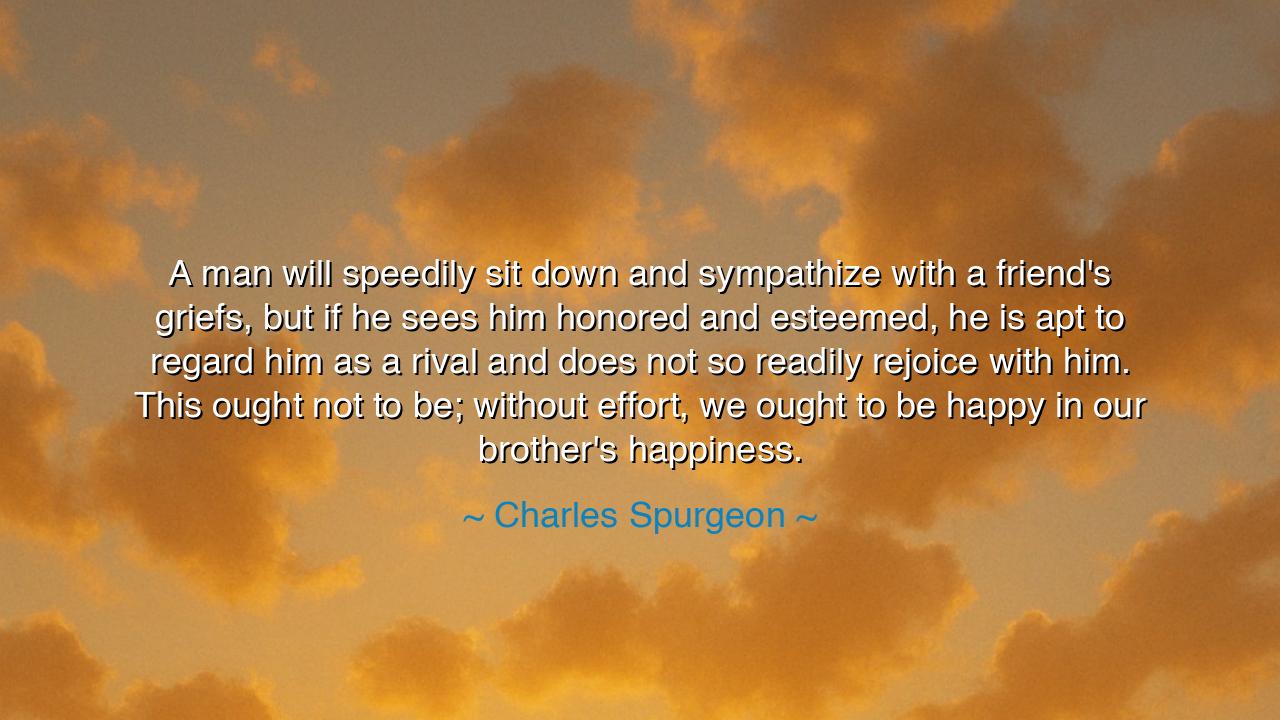
A man will speedily sit down and sympathize with a friend's
A man will speedily sit down and sympathize with a friend's griefs, but if he sees him honored and esteemed, he is apt to regard him as a rival and does not so readily rejoice with him. This ought not to be; without effort, we ought to be happy in our brother's happiness.






The great preacher and sage of the heart, Charles Spurgeon, once said: “A man will speedily sit down and sympathize with a friend’s griefs, but if he sees him honored and esteemed, he is apt to regard him as a rival and does not so readily rejoice with him. This ought not to be; without effort, we ought to be happy in our brother’s happiness.” In these words lies one of the most piercing truths of human nature — that it is often easier for us to weep with others than to rejoice with them. The soul, proud and insecure, finds comfort in the sorrows of others, but feels challenged by their success. Spurgeon, in his timeless wisdom, calls us to a higher way — to the divine art of rejoicing without envy, to the grace of celebrating another’s joy as if it were our own.
The origin of this quote lies in Spurgeon’s deep understanding of the human spirit, drawn from both Scripture and life. As a preacher in nineteenth-century London, he saw thousands of souls — rich and poor, broken and proud — and learned that envy, not hatred, is often the subtler destroyer of fellowship. The Bible itself teaches, “Rejoice with those who rejoice, and weep with those who weep.” Yet Spurgeon observed that while compassion is natural, celebration without comparison is rare. To grieve with a suffering friend costs us little; it confirms our humanity. But to rejoice with a friend’s honor demands humility — it requires that we silence the whisper of jealousy within us.
There is a great irony here. When a friend suffers, we can feel noble in our sympathy, for we seem kind and virtuous. But when that same friend rises in success, receives praise, or shines in ways we have not, the shadows of our own insecurity awaken. We ask in secret, “Why not me?” And thus we turn a friend’s blessing into our burden. Spurgeon, however, calls us to spiritual maturity — to rise above the ego’s hunger for recognition, and to find joy in the joy of others. This, he says, is the mark of a heart truly free — a heart so grounded in love that it cannot be shaken by comparison.
The ancients, too, knew this struggle well. Cain, the firstborn of mankind, could not rejoice in his brother Abel’s offering, and his jealousy led him to ruin. In the Roman world, Julius Caesar’s closest friend, Brutus, could not bear the growing glory of his companion; envy disguised as patriotism became betrayal. But contrast this with Jonathan, son of King Saul, who loved David even as David’s fame eclipsed his own. Jonathan, though heir to the throne, rejoiced in his friend’s destiny. He was not diminished by another’s greatness; he was ennobled by it. Such is the greatness Spurgeon invites us to embody — to love so selflessly that we can delight in another’s triumph as if it were our own crown.
This truth is not only moral but profoundly practical. For envy, once allowed to live in the heart, poisons everything it touches. It turns friendship into rivalry, admiration into bitterness, and joy into resentment. But when we practice rejoicing in others, we enlarge our own capacity for happiness. The one who delights only in his own success will know fleeting joy; but the one who delights in the success of others will never lack for reasons to rejoice. The soul that can look upon a friend’s victory and whisper, “This too is my joy,” lives in abundance, not scarcity.
Consider the story of Nelson Mandela. When he emerged from prison after twenty-seven years, he did not seek vengeance but reconciliation. He rejoiced not in his own freedom alone, but in the freedom of his people, and even in the success of those who had once oppressed him. He understood that true greatness lies not in conquering others, but in conquering oneself — in turning envy into empathy, rivalry into reverence. His life teaches us, as Spurgeon does, that love rejoices in truth and goodness wherever it appears, even when it shines brighter in another.
Let this be the lesson passed down through the ages: do not let envy steal your joy. When a friend is honored, rejoice! When another is blessed, be glad! For in doing so, you free yourself from the chains of comparison and step into the boundless realm of love. The heart that rejoices with others becomes a fountain of peace — untroubled, generous, radiant. And though this may seem difficult at first, Spurgeon reminds us: it should become natural, “without effort.” For when the heart is truly pure, it does not measure worth by who shines more brightly; it simply rejoices that light exists at all.
Thus, beloved listener, learn this wisdom: to love others deeply is to celebrate their joy without reserve. In your brother’s happiness, find your own. In your sister’s success, see the glory of God reflected. The one who rejoices without envy lives beyond competition — in unity, in peace, in eternal fellowship. And that, as Spurgeon teaches, is the truest victory of all: not to rise above others, but to rise above oneself.






AAdministratorAdministrator
Welcome, honored guests. Please leave a comment, we will respond soon